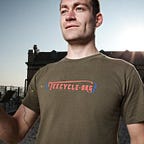The obvious questions
The story behind Tom Wolfe’s suit
Tom Wolfe didn’t dress like most journalists.
His signature wardrobe was a dashing three-piece suit, tailor-made, usually white. He stood out from the crowd and simply looked different.
He cultivated this style throughout his storied career as a writer for Esquire and author of The Electric Kool-Aid Acid Test, a book about eccentric hippies experimenting with acid.
All the while, he wore his elaborate white suit.
Wolfe talked about the subject in an interview with Terry Gross in 1987. It was recently replayed after Wolfe died at age 88.
“Something I’ve always wondered about wearing a white suit is that you really have to protect yourself because anything is going to get you dirty,” Gross said. “And as a journalist, it seems to me you really want to dive into a situation and do what needs to be done. But if you’re wearing all white, you have to keep everything at a certain distance.”
Wolfe explained that this distance from his story subjects helped him ask questions.
Wolfe said that early in his career he tried to fit in when he was doing a story about stock car racing in North Carolina. The problem was when he tried to act like he belonged, he had to put on an act and not ask “obvious” questions that an insider would already know.
“I was dying to know what an overhead cam was,” he said. “People were always talking about overhead cams.”
He had a choice. He could pretend that he knew what everyone was talking about. Or he could show that he had no idea by asking.
The choice was easy.
“For me, it is much more effective to arrive in any situation as a man from Mars than to try to fit in,” he said. “If you’re pretending to fit in, you can’t ask these obvious questions.”
He learned that an overhead cam had nothing to do with a camera. It was short for an overhead camshaft, or part of a car engine. With each question he asked, he could start to put the pieces together and understand a culture that was different than his own.
After that experience in North Carolina, he gave up trying to fit in. He did the same when he was covering hippies that were ingesting large amounts of hallucinogenics. “To have tried to fit into that scene would have been fatal — perhaps literally fatal,” he said.
Instead, he purposely played the role of an outsider so he could ask better questions. He called his role “the village information gatherer.” This allowed him to ask the “obvious questions,” which to many people aren’t that obvious.
“And you’ll be amazed,” he said, “if you’re willing to strike that role.”
